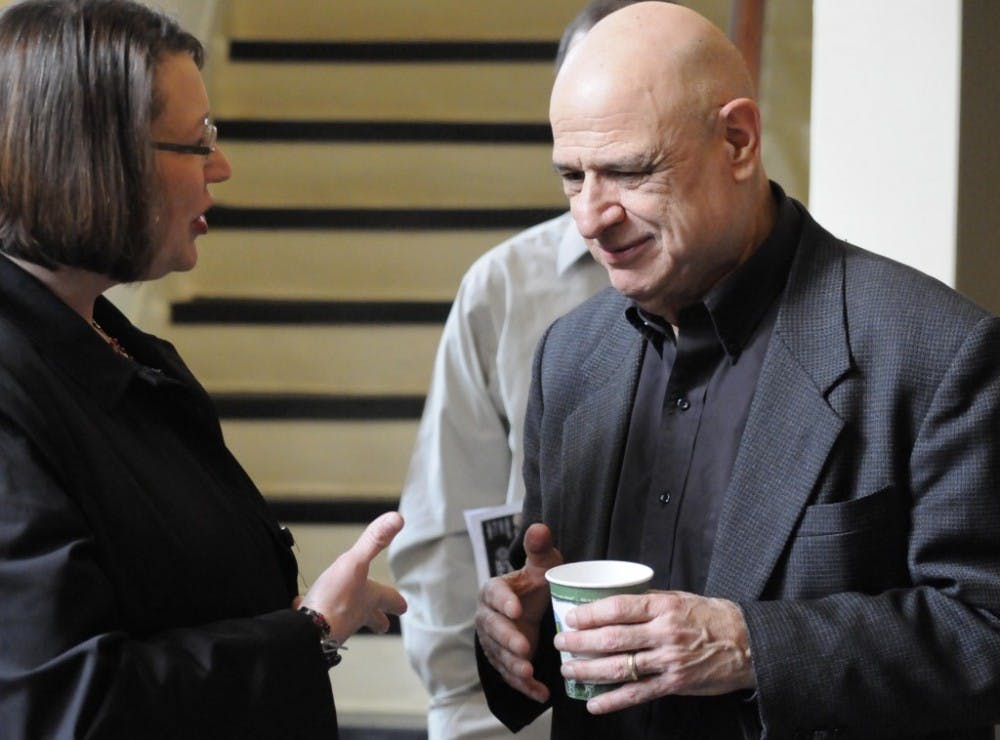A violinist’s waltz fills Whitley auditorium Thursday morning. Earl Danieley, a weekly attender, sits in the second row in front of the podium where, in a few moments, a speaker will give a lecture. The speaker steps up to the lectern after the song ends and presents his ideas about the theme for this year’s lectures, “Change Makers,” meaning people who have changed the speaker or affected others in the world. Afterward, people mill about in the foyer, chatting over donuts and coffee. This is College Chapel.
Although College Chapel is scheduled on Thursdays during the same hours as the weekly tradition of College Coffee, Phil Smith, associate chaplain, said he is aware that College Chapel is not on some students’ radar.
“The name sounds Christian,” said Gabriel Estes, a sophomore music technology major. “The language in the title is a big part (of why I don’t attend). It is not really publicized, and I never really hear about it.”
The service draws a crowd of close to 50 students, faculty and staff members each week.
“The purpose of College Chapel is to take a break from the busy and the mundane, and to reflect on our common journeys with others who seek the same,” Smith said. “Our goal is to get more students there. That’s something we constantly work on, is trying to promote and at least have them aware of where Chapel is and what Chapel is. Usually if people get there, they appreciate it.”
Estes said he has not attended College Chapel during his time at Elon because it does not interest him or cross his mind.
University Chaplain Jan Fuller said the program tries to include a range of diverse speakers from different faiths or even those without a faith. Sometimes the speaker does not mention religion at all, she said.
Nevertheless, students are not aware of the lack of religious emphasis.
“As far as something called ‘chapel,’ I wouldn’t be interested,” said sophomore Avery McGaha. “Just by the name, I would assume it’s some sort of nondenominational Christian meeting.”
McGaha said he already has a spiritual connection through the work he does outdoors for classes, so he feels he does not need to attend College Chapel.
Although the topic does not concern a specific religious denomination, the structure may resemble a religious ceremony, Smith said.
“While I’m sure the structure and framework might feel similar (to a liturgy), we invite speakers to represent a variety of backgrounds and traditions,” he said. “And really what they’re offering is more of a spiritual reflection and not a sermon or a theological reflection. It’s really their story, a personal narrative.”
Fuller said she finds that each speaker at College Chapel leaves listeners with a kind of challenge to think, “Could I be like (this) person?” and have the ability to influence or change people and the world.
“Each (reflection) is so different from the next one and so wonderful,” Fuller said. “Every time I go, I think, now this was the best one, and then I go to the next one.”
Evan Heiser, assistant to the vice president of Student Life and dean of students, attends almost every week, and said that while the Truitt Center does a good job of promoting College Chapel by handing out fliers at College Coffee and other Truitt Center-sponsored events, he tried to encourage more people to come by inviting at least one person to College Chapel every week last semester.
“College Chapel is a recentering, a refocus,” he said. “It definitely is a stress-reliever, just going and stopping and thinking and just listening to the students play their music. It’s one of those traditions that’s unique to Elon where people go when they don’t have to. It’s worth getting up for.”
The university chaplains said they encourage students and faculty to contact the Truitt Center if they have a suggestion for a more comprehensive name for College Chapel.


